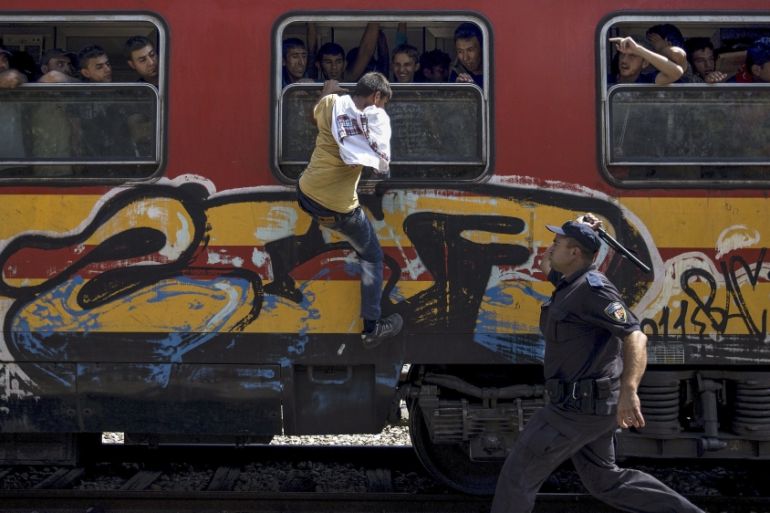Refugees: From Syria to Somalia, tales of displacement
War and persecution forced more than 65 million people from their homes by the end of last year, UNHCR reports.

The UN refugee agency says persecution and conflict in places such as Syria and Afghanistan raised the total number of refugees and internally displaced people worldwide to a record 65.3 million at the end of last year.
The previous year, 2014, had already seen the highest number of refugees worldwide since World War II, with 60 million displaced people.
Keep reading
list of 4 itemsUK passes bill to deport asylum seekers to Rwanda: What’s next?
‘Can’t give them jobs’: Rwandans grapple with fears over UK asylum plan
UK passes law to send asylum seekers to Rwanda after months of wrangling
But last year – when Lebanon, Turkey and European countries staggered under the arrival of large numbers of refugees – topped that record by nearly 10 percent, the UNHCR said on Monday, in the unveiling of its annual Global Trends Report.
The Geneva-based body urged leaders from Europe and elsewhere to do more to end the wars fanning the exodus of people from their homelands.
“I hope that the message carried by those forcibly displaced reaches the leaderships: We need action, political action, to stop conflicts,” said Filippo Grandi, the UN high commissioner for refugees.
“The message that they have carried is: ‘If you don’t solve problems, problems will come to you’.”
With stark detail, UNHCR said that on average, 24 people had been displaced every minute of every day last year, or 34,000 people a day, up from six every minute in 2005.
Global displacement has roughly doubled since 1997, and risen by 50 percent since 2011 alone – when the Syria war began.
|
|
More than half of all refugees came from three countries: Syria, Afghanistan and Somalia.
Turkey was the “top host” country for the second year running, taking in 2.5 million people – nearly all from neighbouring Syria. Afghan neighbour Pakistan had 1.6 million, while Lebanon, next to Syria, hosted at leat 1.1 million.
Grandi said policymakers and advocacy groups face daunting challenges helping the largest subset of displaced people: About 40.8 million internally displaced in countries in conflict.
Another 21.3 million were refugees and some 3.2 million more were seeking asylum.
More than a million people fled to Europe last year, causing a political crisis in the EU.
Grandi called on countries to work to fight the xenophobia that has accompanied the rise in refugee populations, and decried both physical barriers – such as the fences erected by some European countries – as well as legislative ones that limit access to richer, more peaceful EU states.
Such European policies were “spreading a negative example around the world”, he said.
OPINION: A philosophical approach to the refugee crisis
“There is no plan B for Europe in the long run,” Grandi said. “Europe will continue to receive people seeking asylum. Their numbers may vary … but it is inevitable.”
In Lebanon, UNHCR reported that one in three people in the country is a refugee and more than half are children.
At the Sabra refugee camp in Beirut, 12-year old Abdul Jabar Satouf lives with his grandmother Khadija and other family members, and works about 48 hours a week as a mechanic’s apprentice.
“I’m learning something new. This is my new life,” Satouf told Al Jazeera.
Like a ‘death sentence’
Satouf was sent to Lebanon from Syria by his father to help feed his family of nine.
His grandmother told Al Jazeera that their situation in Lebanon is like a “death sentence”.
“Hunger, no respect, humiliation, we don’t have any money,” she said.
Matt Saltmarsh, UNHCR spokesman, told Al Jazeera that there is no desire for the Lebanese government to implement a long-term solution to the refugee crisis.
“The government here are very keen to stress that the refugees will be going home. They will be going back to Syria,” he said.
Hala El Helou, a Lebanese government spokesman, said that the country is already overwhelmed in dealing with the refugee influx.
“Our numbers are very large and today Lebanon cannot handle additional numbers,” she told Al Jazeera. “Having six million people in such a small territory is already a burden by itself.”
|
|